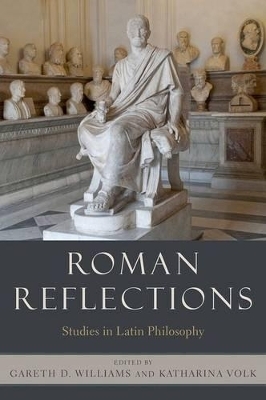
Roman Reflections
Oxford University Press Inc (Verlag)
978-0-19-999976-7 (ISBN)
When the Romans adopted Greek literary genres, artistic techniques, and iconographies, they did not slavishly imitate their models. Rather, the Romans created vibrant and original literature and art. The same is true for philosophy, though the rich Roman philosophical tradition is still too often treated as a mere footnote to the history of Greek philosophy. This volume aims to reassert the significance of Roman philosophy and to explore the "Romanness" of philosophical writings and practices in the Roman world. The contributors reveal that the Romans, in their creative adaptation of Greek modes of thought, developed sophisticated forms of philosophical discourse shaped by their own history and institutions, concepts and values-and last, but not least, by the Latin language, which nearly all Roman philosophers used to express their ideas.
The thirteen chapters-which are authored by an international group of specialists in ancient philosophy, Latin literature, and Roman social and intellectual history-move from Roman attitudes to and practices of philosophy to the great late Republican writers Cicero and Lucretius, then onwards to the early Empire and the work of Seneca the Younger, and finally to Epictetus, Apuleius, and Augustine. Using a variety of approaches, the essays do not combine into one grand narrative but instead demonstrate the diversity and originality of the Roman philosophical discourse over the centuries.
Gareth D. Williams is Professor of Classics at Columbia University and a specialist in Latin literature of the early empire. Katharina Volk is Professor of Classics at Columbia University and a specialist in Latin literature and Roman culture.
Contents ; Contributors ; Preface ; Introduction ; Part I ; 1. Philosophy and philosophi: From Cicero to Apuleius ; Harry Hine ; Part II ; 2. Roman Pythagoras ; Katharina Volk ; 3. Philosophy Is in the Streets ; James E. G. Zetzel ; 4. To See and to Be Seen: On Vision and Perception in Lucretius and Cicero ; Tobias Reinhardt ; 5. Teaching Pericles: Cicero on the Study of Nature ; Gretchen Reydams-Schils ; Part III ; 6. Tyrants, Fire, and Dangerous Things Andrew M. Riggsby ; 7. Precept(or) and Example in Seneca ; Matthew Roller ; 8. True Greatness of Soul in Seneca's De constantia sapientis ; Yelena Baraz ; 9. Minding the Gap: Seneca, the Self, and the Sublime ; Gareth D. Williams ; 10. The Emotional Intelligence of Epicureans: Doctrinalism and Adaptation in Seneca's Epistles ; Margaret Graver ; Part IV ; 11. <"You're Playing You Now>": Helvidius Priscus as a Stoic Hero ; Wolfgang-Rainer Mann ; 12. Platonizing Latin: Apuleius' Phaedo ; Richard Fletcher ; 13. Why Ancient Skeptics Don't Doubt the Existence of the External World: Augustine and the Beginnings of Modern Skepticism ; Katja Maria Vogt ; Works Cited
| Erscheint lt. Verlag | 14.1.2016 |
|---|---|
| Verlagsort | New York |
| Sprache | englisch |
| Maße | 236 x 163 mm |
| Gewicht | 544 g |
| Themenwelt | Geschichte ► Allgemeine Geschichte ► Vor- und Frühgeschichte |
| Geschichte ► Allgemeine Geschichte ► Altertum / Antike | |
| Geisteswissenschaften ► Geschichte ► Regional- / Ländergeschichte | |
| Geisteswissenschaften ► Philosophie ► Philosophie Altertum / Antike | |
| ISBN-10 | 0-19-999976-7 / 0199999767 |
| ISBN-13 | 978-0-19-999976-7 / 9780199999767 |
| Zustand | Neuware |
| Informationen gemäß Produktsicherheitsverordnung (GPSR) | |
| Haben Sie eine Frage zum Produkt? |
aus dem Bereich


